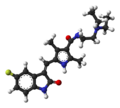Sunitinib
Information about Sunitinib[edit]
Sunitinib is multi-specific tyrosine kinase receptor inhibitor that is used in the therapy of gastrointestinal stromal tumors and advanced renal cell carcinoma.
Liver safety of Sunitinib[edit]
Sunitinib therapy is associated with transient elevations in serum aminotransferase and bilirubin levels and rare instances of clinically apparent acute liver injury.
Mechanism of action of Sunitinib[edit]
Sunitinib (soo ni' ti nib) is an inhibitor of several tyrosine kinase receptors which are associated with tumor growth and angiogenesis. The tyrosine kinase receptors of cancer cells are often mutated and can cause unregulated cell growth and proliferation. Sunitinib is one of several tyrosine kinase receptor inhibitors that have been introduced into cancer chemotherapy and are specially directed at molecular abnormalities that occur in cancer cells. Inhibition of the receptor can lead to dramatic reversal of progression the cancer, although sometimes limited by the development of tumor resistance caused by mutations in the kinase. Sunitinib has special activity against the abnormal tyrosine kinase (cKit) that is found in gastrointestinal stromal tumors (GIST). Sunitinib also has activity against the receptors for platelet derived growth factor (PDGF) and vascular endothelial growth factor (VEGF).
FDA approval information for Sunitinib[edit]
Sunitinib received approval for use in the United States in 2006. Current indications are for unresectable or metastatic GIST with positive cKit (CD117), advanced renal cell carcinoma and advanced pancreatic neuroendocrine tumors. Sunitinib is also used in patients who are intolerant or become resistant to imatinib, the initial tyrosine kinase receptor inhibitor that has special activity against chronic myelogenous leukemia (CML) bearing the Philadelphia chromosome.
Dosage and administration for Sunitinib[edit]
Sunitinib is available in capsules of 12.5, 25 and 50 mg under the brand name Sutent. The typical dose of sunitinib is in cycles of 4 weeks, followed by a rest period of 2 weeks, using a starting dose of 37.5 or 50 mg daily and increasing or decreasing in 12.5 mg increments, with each cycle based upon tolerance and response.
Side effects of Sunitinib[edit]
Side effects include fatigue, diarrhea, anorexia, skin discoloration, rash, hand-foot syndrome, edema, muscle cramps, arthralgias, headache, abdominal discomfort, anemia, cough, and pruritus. Uncommon side effects include heart failure, pancreatitis and renal failure.
Alphabetic list of antineoplastic agents - 0-9 - A1 - A2 - A3 - A4 - A5 -A6 - B - C - D - E - F - G - H - I - JK - L - M - NO - PQ - R - S - T - UVW - XYZ
| Antineoplastic Agents | ||||||||||
|---|---|---|---|---|---|---|---|---|---|---|
* Category
|
-
Sunitinib
-
Sunitinib 3D balls
Ad. Transform your life with W8MD's Budget GLP-1 injections from $75


W8MD offers a medical weight loss program to lose weight in Philadelphia. Our physician-supervised medical weight loss provides:
- Weight loss injections in NYC (generic and brand names):
- Zepbound / Mounjaro, Wegovy / Ozempic, Saxenda
- Most insurances accepted or discounted self-pay rates. We will obtain insurance prior authorizations if needed.
- Generic GLP1 weight loss injections from $75 for the starting dose.
- Also offer prescription weight loss medications including Phentermine, Qsymia, Diethylpropion, Contrave etc.
NYC weight loss doctor appointmentsNYC weight loss doctor appointments
Start your NYC weight loss journey today at our NYC medical weight loss and Philadelphia medical weight loss clinics.
- Call 718-946-5500 to lose weight in NYC or for medical weight loss in Philadelphia 215-676-2334.
- Tags:NYC medical weight loss, Philadelphia lose weight Zepbound NYC, Budget GLP1 weight loss injections, Wegovy Philadelphia, Wegovy NYC, Philadelphia medical weight loss, Brookly weight loss and Wegovy NYC
|
WikiMD's Wellness Encyclopedia |
| Let Food Be Thy Medicine Medicine Thy Food - Hippocrates |
Medical Disclaimer: WikiMD is not a substitute for professional medical advice. The information on WikiMD is provided as an information resource only, may be incorrect, outdated or misleading, and is not to be used or relied on for any diagnostic or treatment purposes. Please consult your health care provider before making any healthcare decisions or for guidance about a specific medical condition. WikiMD expressly disclaims responsibility, and shall have no liability, for any damages, loss, injury, or liability whatsoever suffered as a result of your reliance on the information contained in this site. By visiting this site you agree to the foregoing terms and conditions, which may from time to time be changed or supplemented by WikiMD. If you do not agree to the foregoing terms and conditions, you should not enter or use this site. See full disclaimer.
Credits:Most images are courtesy of Wikimedia commons, and templates, categories Wikipedia, licensed under CC BY SA or similar.
Translate this page: - East Asian
中文,
日本,
한국어,
South Asian
हिन्दी,
தமிழ்,
తెలుగు,
Urdu,
ಕನ್ನಡ,
Southeast Asian
Indonesian,
Vietnamese,
Thai,
မြန်မာဘာသာ,
বাংলা
European
español,
Deutsch,
français,
Greek,
português do Brasil,
polski,
română,
русский,
Nederlands,
norsk,
svenska,
suomi,
Italian
Middle Eastern & African
عربى,
Turkish,
Persian,
Hebrew,
Afrikaans,
isiZulu,
Kiswahili,
Other
Bulgarian,
Hungarian,
Czech,
Swedish,
മലയാളം,
मराठी,
ਪੰਜਾਬੀ,
ગુજરાતી,
Portuguese,
Ukrainian

